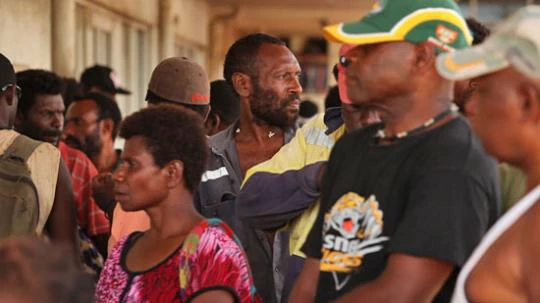
Last month I was interviewing participants in the World Bank’s Urban Youth Employment Project in Port Moresby, talking about the challenges that PNG’s young people face in finding work.
One issue that came up repeatedly was mobility – or the lack of it: the basic ability to travel to and from the workplace. It is no secret that parts of Port Moresby are dangerous and crime is high. There are regular stories of carjacking but public transport is also a huge risk – an issue which disproportionately affects workers coming from poorer parts of the city.
The HR Manager told me casually how she was stabbed at a bus-stop and her billum (bag) stolen; one of the reception staff was stabbed twice on a bus getting home from work. The young woman we were profiling was held up on a bus at gunpoint in the area of Two Mile.
Anecdotally I was told that attacks on public transport seem to be increasing, and the general manager of the hotel said that this was a major issue for his staff.
As with most workplaces, there is a staff-bus that ferries staff to and from work, but even this bus has “no-go areas” – parts of the city where the risks are seen to be too high for it to enter. Staff who live in these settlements will have to make their own way and they face considerable risk, especially if it’s after hours.
A new World Bank report series attempts to quantify some of the costs Papua New Guinea faces from violent crime. According to official figures, crime rates have stabilized over the last decade, but there are significant regional disparities: crime is seemingly on the rise in ‘hotspots’ like Lae, the Western Highlands and the National Capital District, and it is also increasingly violent. Use of firearms is escalating.
The reports look at direct costs faced by local firms – finding for example that the average business loses K90,000 (US$33,000) in stolen property every year; and close to the same amount as a result of closing early due to threats of violence. But it also details many indirect costs that are more difficult (though perhaps not impossible) to quantify.
Issues like staff absenteeism or lost productivity. Businesses being unwilling to expand into new areas or sectors, resulting in significant foregone investment, or small firms unable to get going because of high security costs. The burden on the healthcare system as a result of rising violence in urban areas, or employers not wanting to employ people from certain areas – thus escalating exclusion and inequality.
Or the issue of Gender-Based Violence, which is a known, though too often silent reality across Papua New Guinea. It is a human tragedy but its impacts are wider – incurring costs from disability, illness and accident, on productivity and motivation. Globally, World Bank research suggests that gender-based violence can cost a country between 1.2 and 3.7% of GDP.
PNG is a wonderful country that I have been privileged to work in, and I have always been made to feel welcome there. Too often, crime and violence are outsiders’ first associations with the country and it doesn’t capture the reality or the people on the ground – and all the beauty and wonder that the country has to offer.
But it is true that crime is a reality of everyday life for many people, especially in the cities – for locals more than foreigners. There are no simple answers. The causes of violent crime are largely structural – linked to poverty and inequality: a context where economic growth hasn’t yet benefitted the majority of the people.
As a consequence security costs are a spiraling expense. Private security accounts for an average of 5% of annual operating costs for a business in PNG, with nearly a third of firms reporting that for them it’s more than 10%.
But the evidence suggests that crime is not prevented by such huge investments, but displaced, and these investments will keep increasing. For many emerging businesses, especially smaller enterprises, they are also prohibitive.
“I started out as a truck driver 25 years ago and built up my business from there,” one business owner told me. “Now if I was looking to expand and diversify, I couldn’t do it. It’s the smaller firms that are the most fragile, those getting started. They can’t afford to carry these sorts of risks.”
To my mind, the only real answer, the true conversation, is about addressing the root causes of crime and violence – poverty, inequality, unemployment and marginalization of some groups, especially youth.
These reports aim to inspire this conversation – but what do you think? What are the impacts of crime and violence on the economy? How does it affect you and what are the solutions? I’d be interested to hear your thoughts.


Join the Conversation